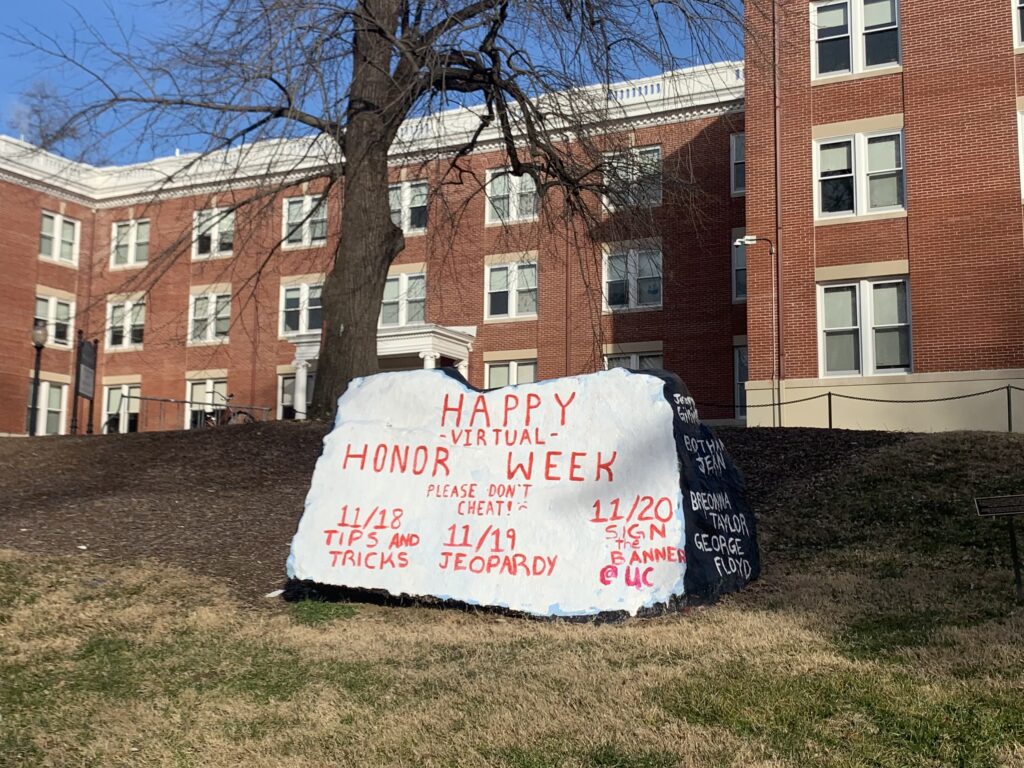Online learning leads to significant increase in cheating
4 min read
In Nov. 2020, students painted the front of the rock to showcase virtual honor week events. | Jess Kirby, The Blue & Gray Press
by LAURA CASTREJON
Staff Writer
In the beginning of the spring 2020 semester, one student was failing their Latin 202 class, despite their best efforts.
“Before we went online I was failing the class, going to tutoring twice a week- once with the professor of the class and once with an actual tutor. I was putting in a lot of effort but it wasn’t helping at all. It was also my last semester and I was starting to get worried that I wouldn’t be able to graduate because I would fail this one class, a class that didn’t actually have anything to do with my major, and it was really stressing me out,” the student, who asked not to be named, said.
But then, just days after students returned from spring break, COVID-19 hit. Students were sent home and classes were shifted to an online format. Suddenly, an opportunity appeared for this student to pass.
“I decided to cheat for my Latin 202 class during the March-May 2020 time frame. When we switched to online I felt so relieved because I was able to use online resources to help me do my weekly quizzes and the final. If it wasn’t for us going online I wouldn’t have passed the class. I feel bad about it, because I’m definitely not the type of person that likes to cheat, but I did what I had to do in order to pass,” said the student.
And this student is not alone. A recent survey of 80 UMW students conducted by The Blue & Gray Press found that over half of respondents had cheated at least once since the switch to online learning in March 2020. About 28 percent of respondents had cheated four or more times since March.
The UMW Honor Council has also seen an increase in cheating.
“We have seen a small expected increase in reports of plagiarism and cheating this academic year compared to previous years. Most of these are open cases so I can not speak freely about them. We are resolving these situations through the expedited process where appropriate and this has meant that this process is being used a lot. Plagiarism and cheating are actually easier to spot because many of the sources used are online and easily searchable,” said Nina Burges, Honor Council president.
Nearly three quarters of respondents also said their professors have given open note tests and quizzes in order to combat cheating.
“I don’t have any issues with cheating as all of my exams and quizzes are open book. I value the quality of academic writing and following instructions more. To combat cheating, I don’t assign any memorization quizzes and give more open note tests,” said Dr. Suzie Kim, assistant professor of art history.
Burges said the increase in open note assessments has affected the types of cases that reach the Honor Council.
“With professors assigning more open book tests, there are more plagiarism cases than exam cheating cases and no stealing/lying cases because the residence halls are quieter for the most part,” said Burges.
According to a survey by Wiley in May 2020, 93 percent of professors feel students are more likely to cheat online than in-person.
Survey respondents also discussed the impact of final exams.
“Every professor I had was super understanding. They made all the tests and quizzes open notes. I would only resort to cheating if I felt like I couldn’t pass on my own. Some professors take note of that and do everything in their power to help us succeed. When professors take this extra step, I’m not worried about cheating on other assignments that aren’t open notes. Because I know they will do anything in their power to ensure that I won’t fail,” said one student on The Blue & Gray Press survey.
However, many students, including about 44 percent of respondents, strongly believe in the Honor Code and have never cheated.
“I have not cheated at all this semester. I’m on the Honor Council here at UMW and I think personal integrity is worth so much more than a better grade on an exam. Obviously, I’ve been tempted. It would be so easy to just open up my notebook and look at what I have written down but I see my professors (most of them) trying their hardest to make things easier for us and I feel like it would be disrespectful not only to them but also to my education to cheat,” said Hope Mills, Honor Council director of community service.
Junior Jean Mondoro agrees.
“I did not cheat, and quite frankly the reasoning behind that is that my conscience wouldn’t let me. My professors were much more lenient with quiz and test restrictions. They were also very clear about what was allowed and what wasn’t. I think that overall, professors were clear about their expectations while also being sympathetic to the unusual semester and individual situations,” said Mondoro, a music and communication and digital studies student.


